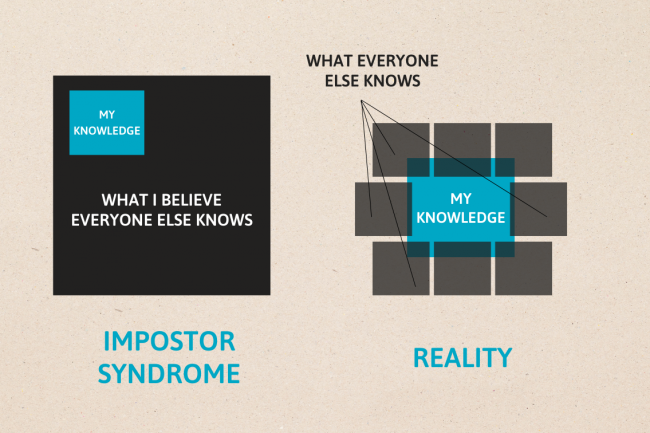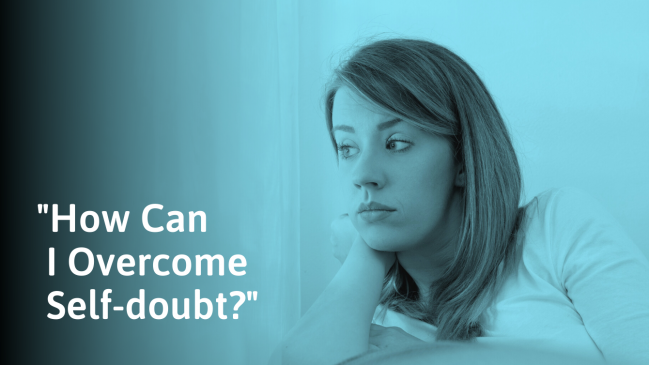Doubt is normal. We all wonder, “Can I really do this?” sometimes. Chronic self-doubt and anxiety are different. You might know your worry is holding you back but don’t know how to get out of your own way.
Feelings of doubt can sometimes masquerade as being sensible or prepared for the worst, but really you’re selling yourself short.
You can overcome self-doubt and unlock your full potential. We’re not saying that you’ll never doubt yourself again, but you can move forward in life, quiet your inner critic, and live a fearless life.
Sections
How to overcome self-doubt
There are 3 main ways that self-doubt shows itself: perfectionism, self-sabotage, and indecisiveness. Addressing underlying feelings of inadequacy can help you conquer each of these types of doubt.
Here are the best ways to overcome self-doubt and boost your confidence.
1. Identify what triggers your self-doubt
Understanding your doubt is the first step to overcoming it. Certain situations, people, or thought patterns might trigger your self-doubt or make it worse.
If specific people regularly leave you doubting yourself, try spending less time with them. They’re probably undermining your confidence.
Self-doubt is normal at difficult points in life. Becoming a parent is a huge increase in responsibility that often increases self-doubt.[1] The same is true for losing a parent, divorce, or sudden unemployment.[2][3][4]
A qualified therapist may help you understand your own reactions better and empower you to deal with situations that trigger your self-doubt.
2. Examine your beliefs
Self-doubt often comes from beliefs we hold about ourselves or the world. Changing those beliefs can silence our nagging doubts.
Limiting beliefs are ones that don’t help you to lead an awesome life. Instead, they feed your fears and leave you stuck. Here are some common limiting beliefs:
- I’ll let everyone down
- I’m no good at…
- I don’t deserve to be loved
- I can’t make a living doing what I love
- I’m never going to be successful
- No one cares about me
- I’ll never get the things I want
- It’s not worth trying if I can’t be the best
- If I fail once it means I’ll always fail
Limiting beliefs can resist change. Rather than trying to force them away, imagine that you are testing a new belief. If you think you’ll never get the things you want, for example, look for evidence to disprove that. Notice that you sometimes get things you want. Gradually, your beliefs can shift.
3. Understand imposter syndrome
Imposter syndrome is a type of self-doubt where it feels like everything you do well is due to luck or circumstances.
You might believe that others are “special.” For example, you may believe that your colleagues are cleverer or more talented than you are. You assume they know all the answers and never realize they look things up just like you.
Imposter syndrome can become worse the more you succeed. You become convinced that you’re operating above your ability level and that people will notice soon.
Knowing that other people feel the same won’t remove your self-doubt, but it might lessen the feelings of shame, failure, and loneliness associated with it. Tom Hanks, Sonia Sotomayor, Serena Williams, and Sheryl Sandberg all struggle with self-doubt. It doesn’t have anything to do with how much you’ve achieved and isn’t something you should feel ashamed of.
When your self-doubt starts to kick in, remind yourself, “Many really successful people feel like this. It’s just something our minds do to us. I can accept that I’m feeling self-doubt, but I am a capable person, and I do have a lot of achievements to be proud of.”

4. See your value, not just achievements
Self-worth and value can be closely tied to our achievements. It’s as if we are trying to provide evidence to prove our value. We’re saying, “Look. I must have value as a person. I’ve achieved all these things.”
This is why doubting ourselves is so painful. We’re taking a rational (though often incorrect) thought about our achievements, such as “I don’t know whether I can succeed at this,” and extending that to our sense of value and identity. You may end up thinking, “My life is meaningless. No one will ever love or respect me.”
Free yourself by trying to understand that you have value separate from what you achieve during school or work. This is part of self-compassion.
This can help get rid of stressful self-doubt by decreasing the risks of failure. Knowing that others will love you even if you don’t always succeed allows you to give your best shot.
You might also be interested in this guide on how to believe in yourself.
5. Move away from constant comparisons
We all compare ourselves to others somewhat but try to keep this in check to reduce self-doubt. Remember, your abilities and achievements aren’t dependent on other people’s.
Make your own goals. Work out what counts as enough for you, and focus on your progress towards that. This helps you minimize comparing yourself with others. Having a goal and purpose helps you find new mental strength to continue despite your insecurity.
Think about a simple example of building a wall. When you’ve finished, there’s a wall. Someone else might have built a bigger wall or built one in less time, but those comparisons don’t change the fact that you’ve built a wall.
It’s easy to realize that comparisons don’t devalue your achievements when talking about something concrete (pun intended) like a wall. It can be harder when thinking about something intangible.
When you notice yourself falling into self-doubt and thinking things like, “Yes, but Sonia would do it so much better than me,” remind yourself that comparisons miss the point. A wall is still a wall.
Extra tip: Try to have a healthy relationship with social media
Social media can pour fuel on the fire of your personal self-doubt.[5] It can hit all of your insecurities and make you doubt your own abilities and achievements.
Try keeping a record of how you’ve spent your social media time and how you feel at the end of it. This lets you focus on aspects of social media that let you feel connected and avoid those which increase your self-doubt.
6. Express your anger
Living full of self-doubt is difficult and tiring. Getting angry can help you find the energy to overcome your crippling lack of self-confidence.
Sometimes, self-doubt can come from suppressed anger.[6] Finding healthy ways of dealing with your anger can help you feel stronger and more capable.[7][8]
Self-doubt and suppressed anger often come from low self-esteem. Because they’re all so closely linked, working on one can lead to improvements in the others.[9]
If feeling angry scares you, practice strategies for accepting your anger in small ways. If you notice yourself getting angry, try not to push the feeling away. Instead, tolerate the feeling a little longer. Tell yourself, “I’m feeling angry about this, and that’s OK. How can I use this anger to motivate me?”
Embracing your anger and frustration can be motivating, but getting angry with yourself and letting your inner critic loose won’t help you feel more empowered. Instead, try to be compassionate with yourself.[10] If you start feeling angry with yourself over your self-doubt, try saying, “Making me angry at myself is self-doubt’s way of protecting itself. Challenging my self-doubt is hard, and I’m going to be kind to myself to make it a little bit easier.”
7. Practice making instant decisions
Self-doubt can make even minor decisions difficult. Practice making low-impact decisions (choosing which shoes to wear or what to have for lunch) quickly.
This helps you overcome the habit of overthinking your decisions or second-guessing yourself. Try sticking with your first decision to discover how things turn out. Realizing that you can make the wrong decision and still have things be OK can help decrease your self-doubt.
8. Avoid self-sabotage
Self-doubt often shows itself through self-sabotage.[11] Self-sabotage is when your actions undermine your goals. For example, you might procrastinate over an important work project, create conflict in your relationships, or feel lacking in motivation.
This is a common behavior, but there are things you can do to avoid self-sabotaging.[12] Try to notice when you’re doing it. You probably know some ways that you self-sabotage, for example, when you have a deadline looming but feel a sudden, overwhelming need to organize your closet. Having your closet more organized might seem beneficial, but it’s more likely a subtle form of procrastination.
Potential costs of procrastination include:
- Less free time for enjoyable activities
- Increased stress
- Self-reproach and guilt
- Having to say no to opportunities later
When you notice a self-sabotaging habit appear, stop and ask yourself what’s going on. Be curious about why you’re tempted towards sabotaging behaviors. It might be that rearranging your closet feels achievable, and you’re worried about not achieving your important task. You might be feeling stressed and want to create an ordered, calm environment around you.
Often, taking that moment can be enough to let you re-focus on your priorities and unleash your inner genius. It can also be helpful to list the costs of your self-sabotaging behavior.[13] For example, some potential costs of self-sabotage in relationships might be:
- Relationship breakdown
- Loneliness
- Guilt
- Financial difficulties
- Loss of trust
9. Learn to accept some self-doubt
Overachievers often have surprisingly high levels of self-doubt. They become perfectionists because they believe that they have to put in extraordinary levels of effort to avoid failure. This doesn’t improve their self-confidence because they tell themselves that they have only succeeded because of their extreme effort.[14]
If your self-doubt manifests as perfectionism, try to accept a little more doubt and give yourself the opportunity to prove your assumptions wrong. If you’d normally spend 3 hours preparing a presentation, try spending 2.5. Another idea is to aim for 80% of the effort it would take you to produce a perfect piece of work.
This tactic can be particularly helpful for creative people, such as writers and entrepreneurs, who set themselves ambitious goals and have high standards.
10. Choose the people around you carefully
Having supportive people around you can help you overcome your self-doubt and bloom. Good friends help you identify your own achievements and can build you up when your doubt kicks in.
Practice believing people who say kind things about you. We often struggle to accept that people mean the nice things they say to us. A good first step is to try to accept compliments without arguing. When you receive a compliment, try just saying “Thank you.” This might make you feel anxious at first, but it can become natural.
11. Challenge negative self-talk
Your inner monologue can have a huge impact on how much you doubt yourself. Paying attention to this kind of self-talk is a small step you can take to become a more positive person.
Avoid minimizing your successes. Just because you found a task easy doesn’t mean you should write it off as an easy task. Similarly, notice when you use absolute terms such as “always” or “never” about yourself.
Telling yourself, “I messed up, just like always,” can create a vicious cycle of anxiety. Instead, try saying, “I made a mistake this time, but I can learn from that.”
Why do we doubt ourselves?
Usually, self-doubt is a result of things we learned in childhood.[15] Some researchers suggest that the foundations for self-doubt appear as early as 18 months old, while others see it develop with adolescence.[16][17]
Self-doubt doesn’t always come from a bad childhood. Loving and supportive parents can inadvertently trigger self-doubt in children. Offering excessive praise for being clever, for example, can leave children worrying that they won’t be loved if they fail.[18] Self-doubt is more common in people who believe that ability levels are fixed than those who believe that ability is malleable.[19]
Common questions
What is normal self-doubt?
A little self-doubt is normal. It helps to remind us that we’re not superhuman. Self-doubt becomes a problem when it stops you from trying new things, causes you significant distress, or takes up too much of your time and energy.
What happens if you don’t deal with your self-doubt?
Self-doubt can make life difficult for you emotionally and practically if you don’t find ways to overcome it. You might find that you sabotage your own success in a relationship or at work. You might become increasingly indecisive, and you might struggle with a lack of self-worth.
Are there any upsides to self-doubt?
In some cases, self-doubt can increase the effort you put into achieving something.[20] This is important for elite athletes and when you are trying to achieve something important. Chronic self-doubt can lead to procrastination, low self-esteem, and stress.






